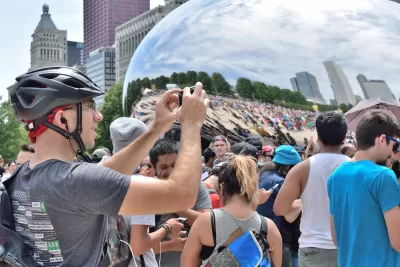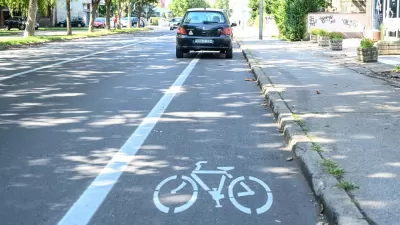A new startup wants to use blockchain and the Uber model to create free, open-source maps.

CityLab's Laura Bliss profiles a mapping startup that aims to combine blockchain and cryptocurrency, open data, and crowdsourcing and gig work. In other words, the company plans to pay people to contribute to free maps. Bliss reports:
"With $1 million in seed funding, Streetcred is building a business model based on the blockchain, where digital tokens called Ether—a Bitcoin-esque cryptocurrency with a fluctuating dollar value—would be paid out to contributors anywhere in the world to populate maps with new points of interest."
The company will only map places, not routes. It hopes to compete with the current industry king, Google Maps, by making its service free to the developers, government agencies, and companies that currently pay Google up to thousands of dollars a month. Though still "refining" its business model, Streetcred says it would make money by soliciting "sponsorships" from companies like Uber or Apple to map points of interest in regions with less coverage from other services.
It could also save money by paying contractors in an unguaranteed currency rather than hiring employees.
In CityLab, Bliss compares the startup's model to other mapping platforms, companies relying on gig workers, and data services.
FULL STORY: Like Uber, but for Cartographers

Planetizen Federal Action Tracker
A weekly monitor of how Trump’s orders and actions are impacting planners and planning in America.

Maui's Vacation Rental Debate Turns Ugly
Verbal attacks, misinformation campaigns and fistfights plague a high-stakes debate to convert thousands of vacation rentals into long-term housing.

Restaurant Patios Were a Pandemic Win — Why Were They so Hard to Keep?
Social distancing requirements and changes in travel patterns prompted cities to pilot new uses for street and sidewalk space. Then it got complicated.

In California Battle of Housing vs. Environment, Housing Just Won
A new state law significantly limits the power of CEQA, an environmental review law that served as a powerful tool for blocking new development.

Boulder Eliminates Parking Minimums Citywide
Officials estimate the cost of building a single underground parking space at up to $100,000.

Orange County, Florida Adopts Largest US “Sprawl Repair” Code
The ‘Orange Code’ seeks to rectify decades of sprawl-inducing, car-oriented development.
Urban Design for Planners 1: Software Tools
This six-course series explores essential urban design concepts using open source software and equips planners with the tools they need to participate fully in the urban design process.
Planning for Universal Design
Learn the tools for implementing Universal Design in planning regulations.
Heyer Gruel & Associates PA
JM Goldson LLC
Custer County Colorado
City of Camden Redevelopment Agency
City of Astoria
Transportation Research & Education Center (TREC) at Portland State University
Jefferson Parish Government
Camden Redevelopment Agency
City of Claremont




























